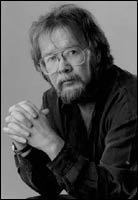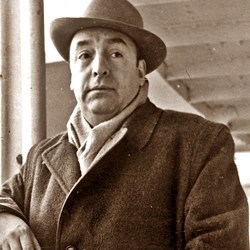Ned Hayes's Blog, page 8
August 5, 2018
The Writing Sings
“This sentence has five words. Here are five more words. Five-word sentences are fine. But several together become monotonous. Listen to what is happening. The writing is getting boring. The sound of it drones. It’s like a stuck record. The ear demands some variety. Now listen. I vary the sentence length, and I create music. Music. The writing sings. It has a pleasant rhythm, a lilt, a harmony. I use short sentences. And I use sentences of medium length. And sometimes, when I am certain the reader is rested, I will engage him with a sentence of considerable length, a sentence that burns with energy and builds with all the impetus of a crescendo, the roll of the drums, the crash of the cymbals–sounds that say listen to this, it is important.”

The Writing Sings was originally published on Ned Hayes
July 22, 2018
Close Amazon And Buy Everyone A Library Card with Unlimited Subscription
A gentleman named Ben Franklin launched an all-you-can-read service called the American library system. It costs the general public and consumers at present absolutely nothing every month and gives unlimited access to millions of titles. One single library in this system, for example, holds 34 million volumes, while others range from 19 million to merely 5 million.
Paid services such as Amazon only give access to a mere 600,000 volumes in pitiful contrast, and demand continuing fees per month from patrons. Various people have various ideas about all of this. My colleague Ursula Le Guin points us to her own experience with the Multonomah Library system, while others such as Anne Lamott mention artistic delivery systems. HuffPo rather sneeringly argued that Amazon wants you to pay $120 a year for a library ticket. Which is true but also what sparks this entirely serious and very pointed thought on public policy.
Let’s just close down the company Jeff Bezos founded, an “Amazon” river that has clearly strayed from its intent, and purpose. Instead, we could easily give all ownership over book production and dissemination to the public library system. Every citizen should have the power of an Amazon Kindle Unlimited subscription, but without paying for it. Why are we paying for books, when they are free in the libraries? I’ll use the numbers from my native US, even though I wasn’t born in this country, because I have personally benefited from the United States system and because I understand both the economics of libraries and the economics of Amazon intimately.
There are about 119,487 library locations (data here). This is direct contrast to Amazon, who has remarkably failed to establish any retail locations of note for dissemination of books, while incurring remarkable lack of profit for their shareholders (Amazon has lost money consistently throughout its history, with only recent small profits to show for its efforts). In fact, a remarkable amount of traffic to Amazon online properties directly relies on library access — 98.9% of libraries provide online access to Amazon’s database.
There are approximately 308 million US citizens, yet there are 1.2 billion visits to the public libraries in the United States every year (according to a 2006 study commissioned by the Gates Foundation) — no doubt the number of U.S. library visits has increased in the last 12 years. So if we calculate the cost of a library visit (against that 1.2 billion figure), against the cost of maintaining the library system, it averages out to $38.96 per person. Amazon, in the meantime, wants to charge $120 year for their “service” — without even providing a single physical location.
So which enterprise is more useful to the civic activity and well-being of the United States?
Each public library district only costs about $8M to maintain (data here). Most of this funding is through public funds contributed by bond issuance — which means typically that the local population actually votes to spend their own money to fund the local library. Meanwhile, Amazon is dealing with significant public outcry over rapacious business practices.
There’s several things leading me to this thought, over and above just trying to make a mischievous suggestion.
The first is that the public libraries have proven that they can administrate the selling and dissemination of books to the general public at a significant discount compared to Amazon. The actual cost of providing such a service is one fixed overhead (the original negotiations to launch the service, having the necessary infrastructure etc) and then a very small marginal payment to each author for each lend of a book. And clearly, the public libraries do this better than Amazon. Since the company cannot maintain a competitive edge with the public library system, why not just declare defeat, divest the shareholders of their profitless endeavor, and give all assets to an entity that clearly is better at this business? This is no different in principle from what the public library system is already doing.
We can also be sure that the library system would accept a very low price for a deal that covered the existing customers of Amazon. Those 1.2 billion library visits can easily be amortized across Amazon’s customers. It’s well known that most customers of Prime don’t actually use those benefits at all, and actually are paying for something useless to them. The book industry is worth nearly $113 billion — that’s bigger than the entire movie industry — yet Amazon can’t make a profit, which is sad and pifitful.
And there’s two more points. The first being that paid subscriptions is exactly how lending libraries started out. Both WH Smith’s and Boot’s used to run lending libraries. For a fee one had unlimited access to the stock of that profit making private sector enterprise. It was the specific attributes of books as physical objects in limited supply in any one location that led to councils (ie, the State) taking over library provision. Now that Amazon has had a fair trial at using modern technology, and has so clearly failed to meet the general public’s demand for reading, perhaps the need for an Amazon-style online system no longer exists? Clearly, Amazon hasn’t made a dent in the need for physical libraries with physical books, so perhaps there’s no need for Amazon whatsoever.
The second point is that Amazon has resisted the idea of contributing to the creative commons and the civic good — in fact, executives in the company even made a point of coming out against public funding of a common need, despite the fact that Amazon reaps great dividends in terms of public tax benefits from various municipalities. Clearly, this corporation doesn’t understand the way American capitalism works — you can’t suck from the public teat forever, and refuse to contribute! Laughable in the extreme!
Let’s consider this proposal seriously.
More titles, easier access and quite possibly a saving of public funds to Bezos and his ilk. Why wouldn’t we simply junk Amazon’s profitless enterprise and ensure that physical libraries receive all they need to provide all their long-term benefits to the entire country?
(Ned Hayes is a leading technologist, tech company executive and a published author)
(yes, I’m mocking the idiotic proposal by Tim Worstall that can be found here. Yes, he is a flaming idiot who has no sense of history, no sense of civic duty, and is probably a libertarian — my highest insult.)
Close Amazon And Buy Everyone A Library Card with Unlimited Subscription was originally published on Ned Hayes
July 9, 2018
Bookstores: Politics and Prose in D.C.
http://www.politics-prose.com/search/site/Ned%20Hayes
The Initial History
Carla Cohen and Barbara Meade opened a small store at 5010 Connecticut Avenue NW in the autumn of 1984, working by themselves during the day and with one part-time employee who helped at night. Before a year was up, there were two full-time employees. By 1988-89 the staff numbered half-a-dozen and the store was bursting. It moved across the street to 5015 Connecticut Avenue NW in the summer of 1989. The bookstore now occupies more than 9,000 square feet of sales space, and almost 16,000 feet of total business space, including offices and a coffeehouse called The Den. The staff exceeds 100 employees.
The Merger
In 1999, Jewell Stoddard, a partner in the Cheshire Cat, a prominent children’s bookstore located about ten blocks up the street, decided to move in with Politics and Prose. It turned out to be a perfect match, and P&P’s children and teens department is now one of the great strengths of the Connecticut Avenue NW store.
Change of Ownership
Carla Cohen died in October 2010, and in June 2011, Politics and Prose was purchased by Bradley Graham and Lissa Muscatine. Brad was a longtime journalist with The Washington Post and author of two books. His wife, Lissa, also had worked as a Post journalist for a number of years, and then served as chief speechwriter and senior advisor to Hillary Clinton at the White House and the State Department. Click here to read a message from Brad and Lissa.
The Name
The store’s name was set at the start by Carla Cohen. She wanted something that evoked Washington but didn’t sound pretentious. The name Politics and Prose had some shortcomings in the beginning because it led a number of customers to think the store specialized in political books. But now P&P’s reputation as a place that carries a wide variety of literary offerings is well established.
The Mission
P&P’s mission, as articulated by Brad and Lissa, is this: “Politics and Prose is a D.C. based business devoted to cultivating community and strengthening the common good through books, programs, and a respectful exchange of ideas. We’re committed to exceptional customer service and to the values of independence, inclusion, and diversity.”
Today at Politics and Prose
Even as P&P confronts a changing world of e-books and e-readers, it continues to enjoy rising revenues and solid profitability. One of its signature features is an extensive line-up of author talks—at least one nearly every night of the year and often several a day on Saturdays and Sundays, plus frequent events at various off-site venues. Publishers compete to place their authors at P&P, and authors like coming to the store, in large part because the audiences often are sizeable, informed, and keen to support genres from literary fiction and poetry to narrative non-fiction and topical journalism. “Like the children of Lake Wobegon,” Carla and Barbara used to say, “all of our customers are above average.”
P&P does more than just sell books, offering a range of programs. It sponsors dozens of classes on various literary topics and hosts 18 in-house book groups. It sponsors week-long trips to such countries as France, Italy, and Cuba, as well as shorter day visits to places closer to home. And its coffeehouse and wine bar, renovated in 2016 and dubbed The Den, has a reputation for serving some of the best coffee in Washington.
Still, the store’s greatest strength may be its staff, who are known for their knowledge of literature and their ability to help customers find just the right books. P&P even offers a concierge subscription service that will send customers a book each month they are sure to enjoy.
In 2015, P&P joined forces with Busboys and Poets and began managing the book sales at some Busboys and Poets locations and sponsoring author talks there. This innovative business arrangement proved successful for both companies, uniting P&P’s bookselling skills with Busboys and Poets’ track record of operating multi-use, food-and-event gathering spaces. This partnership ended amicably in 2017, with the lessons learned paving the way for P&P to open new standlandone locations in the D.C. area. On October 12, 2017, we look forward to opening a new location at The Wharf, a major new waterfront development in South West Washington.
Luck, Hard Work, and a Sense of Community
The success that P&P has had represents, in part at least, the luck of being in the right place at the right time. The company started when it was still possible for a bookstore to begin small and grow bigger. It was well on its way before the chains opened, and it has remained able to compete effectively even in the Internet age, seizing opportunities, increasing its visibility, expanding its business, and further deepening its roots in the community. Under the leadership of Brad and Lissa, the store has continued to imagine, innovate, and adapt while remaining true to the mission first established by Carla and Barbara. And the founders’ words still ring true: “We have built a community, and the community has built the store.”
Ada’s is one of my literary touchstones, and I hope you enjoy the read!
Find my books at Ada’s Technical Books
[Read more BOOKSTORE POSTS]
Pinterest – Ned Hayes Bookstore Board
Bookstores: Politics and Prose in D.C. was originally published on Ned Hayes
June 26, 2018
Poem: Night In The Gardens Of Port Of Spain
Derek Walcott
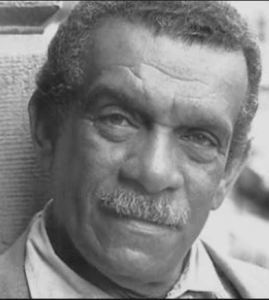
Night, the black summer, simplifies her smells
into a village; she assumes the impenetrable
musk of the negro, grows secret as sweat,
her alleys odorous with shucked oyster shells,
coals of gold oranges, braziers of melon.
Commerce and tambourines increase her heat.
Hellfire or the whorehouse: crossing Park Street,
a surf of sailor’s faces crest, is gone
with the sea’s phosphoresence; the boites-de-nuit
tinkle like fireflies in her thick hair.
Blinded by headlamps, deaf to taxi klaxons,
she lifts her face from the cheap, pitch oil flare
toward white stars, like cities, flashing neon,
burning to be the bitch she must become.
As daylight breaks the coolie turns his tumbril
of hacked, beheaded coconuts towards home.

[Read more Poetry Posts]
Poem: Night In The Gardens Of Port Of Spain was originally published on Ned Hayes
June 21, 2018
Poem: Forgotten
A Final word
The note in my pocket says,
politicize my death.
Rip me out
of passive tense
the way I was
from this place:
with a bang.
Executions
don’t
just
happen.
See how complicit you are.
Show me you’ve learned something.
Pay attention, it says,
to the taste of altered carbon
settling against your tongue.
Notice the way it exposes your gums,
and swallow your two cents.
Lap up marrow from shattered bones.
Let it nourish your own into action.
I’m more than a number, meant
more for this place, but this
will have to do, and
I don’t want
to be forgotten.

Poem: Forgotten was originally published on Ned Hayes
June 15, 2018
Poem: If You Forget Me, Pablo Neruda
You know how this is:
if I look
at the crystal moon, at the red branch
of the slow autumn at my window,
if I touch
near the fire
the impalpable ash
or the wrinkled body of the log,
everything carries me to you,
as if everything that exists,
aromas, light, metals,
were little boats
that sail
toward those isles of yours that wait for me.
Well, now,
if little by little you stop loving me
I shall stop loving you little by little.
If suddenly
you forget me
do not look for me,
for I shall already have forgotten you.
 If you think it long and mad,
If you think it long and mad,
the wind of banners
that passes through my life,
and you decide
to leave me at the shore
of the heart where I have roots,
remember
that on that day,
at that hour,
I shall lift my arms
and my roots will set off
to seek another land.
But
if each day,
each hour,
you feel that you are destined for me
with implacable sweetness,
if each day a flower
climbs up to your lips to seek me,
ah my love, ah my own,
in me all that fire is repeated,
in me nothing is extinguished or forgotten,
my love feeds on your love, beloved,
and as long as you live it will be in your arms
without leaving mine.

[Read more Poetry Posts]
Poem: If You Forget Me, Pablo Neruda was originally published on Ned Hayes
June 9, 2018
On Writing: Where And How I Write
I read something today that really surprised me. The brilliant Kris Rusch wrote that some writers cannot write on planes. This surprised me, because I’ve never been one of those writers who just writes in a certain location or a certain environment. Sure, it’s tempting to be one of those “special snowflake” writers, but I wouldn’t get near enough writing done if I chose that route.
Out of that thought, I thought I’d chart my own route. I thought I’d make a small list of the places and times I’ve written, just for my own amusement. 
Here’s the List of how I write:
Writing via different mediums (I write in notebooks, by hand, in pen and pencil. My most recent complete novel was hand-written before being typed in. I also write on various software products on Windows laptops, Mac laptops, and via audio-dictation on my phone and tablets. I’m not religious about what tools I use, but I am religious about writing every day.)
Writing with different instruments (I’ve written whole notebooks that are full of a scribbled mass of fiction composed with ballpoint pens, fountain pens, pencils, felt-tip pens and even a few crayon paragraphs when I couldn’t find a working pen. I’ve composed on torn scraps of paper, newspaper margins, magazines, the backs of old books, and even on restaurant napkins — oh, and occasionally, I buy a fresh clean notebook for this purpose. Typically the cheapest available.)
I met a writer who actually would not write unless they had their special leather-covered notebook and a fountain pen. I was wholly under-whelmed: I mean, how do you get any writing done, if you need special equipment? It’s not like rock-climbing. No one will die if you write with a pencil, my friend.
 Writing around the clock (I’ve written at all the following times: 7-10 a.m., lunch time 11:30-1 pm, afternoon 3-6 pm, thru dinner 6-8 pm, after dinner and bedtime writing 8 pm – 12 am, late night writing 12-3 a.m., early morning writing, 4:30 am-7 am. The longest I’ve ever written one one stretch of 16 hours. The shortest is about 10 minutes at a concert once.)
Writing around the clock (I’ve written at all the following times: 7-10 a.m., lunch time 11:30-1 pm, afternoon 3-6 pm, thru dinner 6-8 pm, after dinner and bedtime writing 8 pm – 12 am, late night writing 12-3 a.m., early morning writing, 4:30 am-7 am. The longest I’ve ever written one one stretch of 16 hours. The shortest is about 10 minutes at a concert once.)Writing in different postures (I’ve written while standing up, while sitting at my desk, while lying down. I wrote a thought down once while riding a bicycle, but I’ve never managed to write while running.)
Writing at different furniture (I often write at my jerry-rigged standing desk in my home office. But I have also written sitting down in my chair, and at my kitchen counter, on the couch while hanging out with my children, in the backyard on the lawn, beside the pool at a pool party, and on top of a wine barrel at a crowded party full of people.)
Writing while driving (When I drive, I write 99% thru audio-dictation on a hands-free headphone/microphone, and just recently I crossed the 20K line written by audio-dictation to my phone. Only occasionally, have i hand-written a quick thought by hand on paper while driving)
Writing every day of the week (Yes, I’ve written Mon-Fri and Sat and Sun. I’ve written during work days, and right thru a vacation (finished a book on vacation)
Writing at Home (I’ve written in every room in my house, including the kitchen and the bathroom.)
Writing at Work (before meetings, after meetings, early morning and late afternoon. Every now and then at lunch, and only occasionally, during a meeting, when a thought occurs to me. I respect my work hours and I get a lot done at work… but it is interesting that in just a 15 minute break, I can crank in 500 words, if I have a good idea. I love my work at Intel… and it’s a great motivator for me, so I’m energized when I get to my writing after work each day.)
 Past jobs: Once I knew I was going to get laid off at a company, so I started just writing at work until the call to the manager’s office came. I thought it would be 3 days of limbo, but they waited 3 weeks “because I looked so productive.” So I ended up finishing writing the book at that job!
Past jobs: Once I knew I was going to get laid off at a company, so I started just writing at work until the call to the manager’s office came. I thought it would be 3 days of limbo, but they waited 3 weeks “because I looked so productive.” So I ended up finishing writing the book at that job!Writing on other transport (I’ve written on my laptop and in my notebooks on public buses, public trains, small shuttle planes, large 747 planes, on small transports and as a passenger in cars.
Writing while waiting (I relish getting way-laid by a delayed flight in an airport or while sitting on an airplane, because it’s almost like I can step out of time, and have a dedicated hour or two to write. I love sitting on a plane, stuck there with nothing but a notebook, a pen OR a laptop. I can get a couple hours of writing in while everyone is whining around me. It’s heaven to know that no one can bother me: I’m stuck outside of time, able to do nothing but write.)
An ideal day is when I get writing in. It doesn’t matter if I have a two hour commute by car (I can write by audio dictation), or if I’m stuck in an airport (yay, time out just to write!), or if I’m at home (I can wake up early and write in peace and quiet in my home office before work or Saturday chores).
I don’t care where I am: I can write.
A literary update from NedNote.com
Readers can find my books at these bookstores:



On Writing: Where And How I Write was originally published on Ned Hayes
June 6, 2018
Poem: Bumblebees Are Made of Ash
Bumblebees Are Made of Ash
Martha Silano (@marthasilano in Thrush Literary Journal)
The day is a dragonfly hovering in the Timothy. It could rain for months
before the sun goes down. An orange buoy bobs while a sparrow
sings through a wall. The world smells of cedar, skunk spray,
a sedge’s sharp edge. The cat’s ears clear their throats,
prepare to speak. Kinnell called it “the inexhaustible
freshness of the sea.” As if you could imitate
a preening cormorant. As if she’d said can’t
lean this way, but you heard can’t live,
destiny’s dangling web. A horse
82 miles from its barn while
your brain swings open
like a giant pink
gate.

[Read more Poetry Posts]
Poem: Bumblebees Are Made of Ash was originally published on Ned Hayes
May 28, 2018
Poem: Ligament
Last spring, I had the pleasure of spending an evening with Charif Shanahan at the AWP conference, when we were both invited readers for a reading sponsored by our publishers. I’m excited that his poem Ligament appeared in The New York Times Magazine in the fall. He’s currently a Stegner fellow at Stanford, and I run into Charif from time to time, when I’m in California.
Ligament
By Charif Shanahan
Even after she cut into my shoulder
Coldly, with a scalpel, resetting my clavicle,
Tying it down with borrowed ligament and screwing it
Into place, even after she sutured me shut,
Sewing the two banks of skin across the thin blood river,
Watching me sleep the chemical sleep
Until tender and hazy I awoke — Even after all that,
What seems the least plausible is how
She had known, walking into that white room,
To put her hand for just a second in my hand.

[Read more Poetry Posts]
Ligament appeared first in the New York Times Magazine
Poem: Ligament was originally published on Ned Hayes
May 22, 2018
Bookstores: Common Good Books in St. Paul
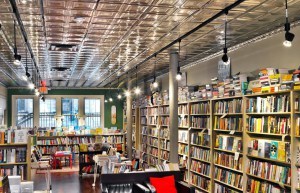
Common Good Books is a wonderful little bookstore in St. Paul, Minnesota. In the mid-2000s, I was in Minnesota for graduate school and I worked on the Macalester College campus as a part-time job during my grad studies (more info on my studies in A.N. Whitehead and post-humanism here). In late 2006, just around the corner from Macalester College, I happily discovered a little gem of a bookstore.
At that time, Common Good Books was located below Nina’s Coffee Cafe at the corner of Selby and Western. The tiny little bookstore had a wonderfully welcoming staff though and didn’t mind me browsing for uninterrupted bookish hours there.
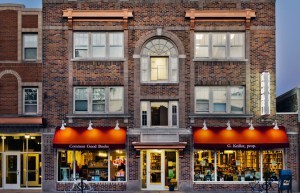
As I browsed, I discovered that Garrison Keillor himself had opened Common Good Books , and owned the entire business.* This explained why I’d caught a glimpse of a very tall man with extremely bushy eyebrows peering at me critically over the stacks one day, before he hunched himself down again over his own book. He didn’t look exactly happy to see me, but neither did he look unhappy. On that day, he definitely wasn’t on site to check the books and take time to run the Common Good Books business: he was just a reader. Keillor on that day was a tad distracted, in fact he looked distinctively bookish, in a manner peculiar to Minnesota bookworms: a Keillor-esque manner. I was happy to see Keillor, but I didn’t interrupt him, because clearly we were both there just as literary patrons and customers, just browsing for the next good read. It was a little lift in my day to know someone cared so much about books. Despite running a national radio show and writing numerous books, Keillor had taken time out of his busy day just to browse in a bookstore.
*(I know that now Keillor’s reputation has been besmirched by his own actions, but back in 2006, Keillor was an undisputed lion of the literary scene, whose reputation had no fault. Sad to say, his own actions demonstrate that we can’t look to him for literary leadership. I’m disappointed in him, to say the least)
 Less than a year after I discovered the little gem of a place, we left Minnesota to return to our home state of Washington. In the years to come, I commenced being an author myself. But I remembered my late afternoons in Common Good Books with great fondness. In fact, as I wrote, I often pictured my books finding a welcome home on the cozy bookshelves of Common Good Books . And I’m now excited to note that, in fact, you can find my books on the shelves today!
Less than a year after I discovered the little gem of a place, we left Minnesota to return to our home state of Washington. In the years to come, I commenced being an author myself. But I remembered my late afternoons in Common Good Books with great fondness. In fact, as I wrote, I often pictured my books finding a welcome home on the cozy bookshelves of Common Good Books . And I’m now excited to note that, in fact, you can find my books on the shelves today!
Other readers also found a welcome home at Common Good Books. Keillor’s little bookstore had become a success! So in 2012, the bookstore moved locations to a grander, sunnier (and more discoverable home on the corner of Grand and Snelling. This was a much more discoverable location, and in fact many hundreds of more readers discovered Common Good Books in this new location. The bookstore was rapidly named as one of the Top Seven Bookstores in the Twin Cities.
Today, Common Good Books has a wonderful open space and an excellent inventory of new books, with a profoundly welcoming children’s section. The bookstore also has a very nice space to host visiting authors. Over the past few years, Common Good Books has added many author events, and now the store is on the regular itinerary for national author tours!

A few years ago, I had the opportunity to return to the Twin Cities, and I was happy to drop in and check on the shelves at Common Good Books . I was happy to see that the wonderful manager Martin S. and the assistant manager David E. were still present and accounted for, and were just as welcoming as I remembered.
Common Good Books is one of my literary touchstones, and I hope you enjoy the read!
Find my books at Common Good Books in St. Paul, Minnesota
[Read more BOOKSTORE POSTS]
Pinterest – Ned Hayes Bookstore Board
Bookstores: Common Good Books in St. Paul was originally published on Ned Hayes

